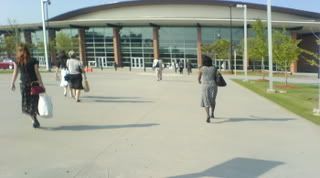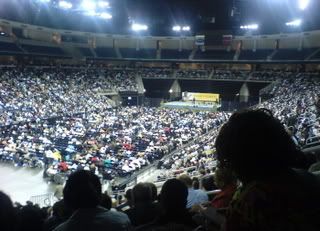
The past sunday July 1, 2007 me and my friend Daniel attended the 2007 District Convention of Jehovah's Witnesses. I must say that it was both interesting and educational. Let me start with the interesting.
On our way to the venue, we were followed by a really sweet car. It was a Lotus. I thought they stopped making those? Apparentely not. As we pulled into the packed parking lot, guess who parked beside us? You guessed it; a freakin sweet, brand new, Lotus. And no, I didn't get a picture :-(

As we were walking in we realized that we were late because it seemed that everyone had pretty much found their seat. Luckily, one of the ushers, Tom, found a pretty descent seat for us. Ok, so maybe it wasn't so descent.

As we found our seat, a short talk was delivered titled, "Examining the Scriptures Daily Builds Endurance." Most of the talks were ones that most Christians wouldn't have a problem with. There were slants here and there, but for the most part it was fairly agreeable. I'm not going to lie though; the talks were not that exciting. They were very dry and dispassionate. In fact, I would be willing to bet that each of the talks, with the exception of the last, was prewritten by the Watchtower. I'm sure each speaker (there were many) added his own expressions and wording occassionaly; but for some reason I doubt that each speaker wrote each message on his own. Either way it doesn't really matter; its the content that is important.
The Hymns were especially awkward. As everyone stood up to sing to a prerecorded orchestra track, me and Daniel decided to stand up to out of respect. But the last thing we were going to do was sing. Unfortunately, the guy next to me decided to give me a hymn to sing. I smiled and accepted it. At this point I regret it, but I didn't have the guts to say no. But it was quite educational, as we got to read what they were actually singing. One of the hymns (207) were of particular interest because it spoke of not having two masters and two Gods but rather to have only one master and one God, Jehovah. Immediately, I was reminded of Jude 4;
"For certain persons have crept in unnoticed, those who were long beforehand marked out for this condemnation, ungodly persons who turn the grace of our God into licentiousness and deny our only Master and Lord, Jesus Christ.."
If Jesus is your only Lord and Master (which Trinitarians have no problem with), then how can you sing hymns that say you don't serve two Gods or two Masters if you, as a Jehovah's Witness, clearly do? I wondered if anyone else realized the implications of this hymn? Probably not.
After a long series of talks, we finally got to a talk that seemed to carry some interesting points. It was titled, "Who are the realy followers of Christ?" Me and Daniel looked at each other and nodded as we were hoping for something interesting. It turned out to be what I expected; the typical "we are unique and different from everyone else" talk that we often hear of JW's. And they are right! They most certainly are unique.
I wish I had taken notes, but there were only a few points that really aroused my interest; those being the Divine Name and the door-to-door ministry. I think this talk was meant to be not only an encouragement to JW's, but an "evangelical" message to show non-JW's what the JW's are all about.
The Divine name (Jehovah) part of the talk was nothing that I hadn't heard before. It was basically, "All true Christians know the name Jehovah." That may be a bit simplified, but it was the gist of the message. Exodus 3:13-15 was referenced as usual. But, of course, no mention was given to the fact that God's name is not just Jehovah; it is "I AM" as well. And the point here is not to stress that God has two names, as if its all about words. The point is that the "name" is not just a word; but God's character. In other words, when we speak of God's "name" in a biblical context, we are speaking of His nature; His character. If God's "name" is "I AM," what does that mean? It means that God is eternal, without beginning or end. He is forever present. There is no "back then" or "future" for God; there is only a "now" because God is not bound by time. Doesn't this make much more sense when we take this into consideration in light of the context of Exodus 3:13-15? Yes it does. And it always leaves me scratching my head when JW's place more emphasis on God's "name" than on God's nature, character, and attributes.
The other point of the talk had to do with their emphasis on door-to-door ministry. If you are unfamiliar with their reasons for doing this, they base it primarily on Acts 20:20,
"How I did not shrink from declaring to you anything that was profitable, and teaching you publicly and from house to house, solemnly testifying to both Jews and Greeks of repentance toward God and faith in our Lord Jesus Christ."
I really like Ron Rhodes' explanation of this verse,
First, we must point out that there is good reason to believe that the word "house" in Acts 20:20 most likely refers to house-churches. In the early days of Christianity, there was no centralized church building where believers could congregate. Rather, there were many shall house-churches scattered throughout the city.
As we examine the New Testament, the early Christians are seen "breaking bread from house to house" (Acts 2:46; cf. 5:42) and gathering to pray in the house of Mary, the mother of Mark (Acts 12:12)...In light of the above, it may be that the apostle Paul's ministry was actually from house-church to house-church. This interpretation seems especially likely in view of the fact that when Paul said, "I did not shrink from declaring to you anything that was prifitable, and teaching you publicly and from house to house" (Acts 20:20), he was speaking not to people in general but to "elders of the church" (see verse 17). If this interpretation is correct, then Acts 20:20 does not support the Watchtower contention that the Jehovah's Witnesses are the only true believers because they are the only followers of Jehovah who go house to house.
Even if a house and not a house-church is meant in Acts 20:20, it still would not support the Watchtower interpretation. That something took place int he first century of church history is not grounds for saying that the same thing should be done throughout every century in church history.
For example, we read of individual members of the early church that "no one claimed that any of his possessions were his own, but they shared everything they had" (Acts 4:32). Does the fact that a redistribution of wealth happened historically in the early church mean that you must give up all your personal property so it can be equally distributed among the poorer Jehovah's Witnesses at the Kingdom Hall? (Reasoning from the Scriptures with the Jehovah's Witnesses, pg. 46-47)
I summarized this point to a friendly JW family that I had met (Tom's family, mentioned earlier). I pointed out that its more important that we emphasize the fact that true Christians certainly should share their faith before we ever talk about the method. But it seems that the talk was emphasizing the door-to-door aspect, as if thats the best and only way to do it. This is how it came across. But after bringing it up, the family to whom I was speaking told me to keep in mind that this is not necessarily what they are teaching. And they agreed that as long as we are obeying the great commission (I wonder why Acts 20:20 is more emphasized than Matthew 20:18-20) then we were doing Jehovah's Will. This wasn't a point that I really wanted to fight over, but it was something that aroused my curiousity.
Another point they emphasized that we will never hear the end of is that "Jehovah's Witnesses are performing the greater missionary works than any other organization." While it may be true that Jehovahs Witnesses are unique in their efforts, this doesn't mean that their efforts are "greater". Although I think it would be pointless to prove, the Jehovah's Witnesses would have to show statistically how their efforts are greater than, for example, the North American Missions Board. I think its pointless because it is totally arrogant to claim that "we are better than you because we do more missions work." I never claim such things for myself and I would never claim that for an organization, even if it is true. God is more concerned about what is in our hearts; not necessarily how many people we try to convert. Just as a side note, I do hope that the JW doesn't take this the wrong way. I am simply expressing myself and how I interpreted what was being said at the convention. If I am misunderstanding something, feel free to clarify it for me.
In the next post i'll describe what took place after the lunch break.



2 comments:
It's good that you took the time to attend and made some mental and visual notes! I like reading and hearing others take on what went on and you can never know unless you are honest ;^)
I hope to check out your next post - peace out!
SUMMARIES OF OVER 550 JEHOVAH'S WITNESSES LAWSUITS & COURT CASES
The following website summarizes over 250 lawsuits filed by Jehovah's Witnesses against their Employers:
EMPLOYMENT ISSUES UNIQUE TO JEHOVAH'S WITNESS EMPLOYEES
http://jwemployees.bravehost.com
The following website summarizes 300 U.S. court cases and lawsuits affecting children of Jehovah's Witness Parents:
DIVORCE, BLOOD TRANSFUSIONS, AND OTHER LEGAL ISSUES AFFECTING CHILDREN OF JEHOVAH'S WITNESSES
http://jwdivorces.bravehost.com
Post a Comment